- Home
- Nancy Pickard
The 27-Ingredient Chili Con Carne Murders: A Eugenia Potter Mystery Page 4
The 27-Ingredient Chili Con Carne Murders: A Eugenia Potter Mystery Read online
Page 4
Sobbing, crying heartbroken apologies to her grandfather, Linda abandoned him and Patches. She did as she knew he would have instructed her: she wheeled Taco around and they ran out of the spotlight, stumbling over the same sharp rocks they’d so cautiously navigated coming into the canyon. I can’t ride home! They’d find me on the open range! Got a good look at me in their headlights. She glanced back over her shoulder, up at the ridge, but the headlights were descending now, so whoever was driving clearly knew the terrain, knew there was a dirt road down from the top. And then, in a moment of horrible truth, she caught a glimpse of the truck in profile, and gasped her recognition of it. Linda turned her face into the wind again and urged Taco to go faster. “Por Dios! Please! No! It isn’t possible!” Her grandfather’s voice spoke to her sternly over her anguish: Run, my granddaughter. Escape. Hide. Linda obeyed. She guided Taco into the deep shadows on the western edge of the mountains, where nobody coming down from the ridge could see her, and then she raced, raced for the only shelter she could think of, a place that practically nobody else knew about, where almost nobody could find her, if she could get there, if she could make it, if she could only get out of sight long enough to fool the truck’s driver into losing her for the time it would take her to reach the favorite hiding place of her childhood.…
Taco raced as if from demons, with Linda hunched over his neck.
The wind dried the tears from her face, even as they fell. Grandpa!
CHAPTER 4
There was no one to meet Mrs. Potter at the Nogales Airport when she arrived there early Sunday evening.
She waited an hour and a half, but no one came for her.
For the first twenty minutes, Mrs. Potter stood outside the terminal with her suitcases at her side, expecting Ricardo’s red Ford pickup truck to pull up at any moment. It was a pleasant wait and she luxuriated in the feeling of the warm, dry air on her face, although she immediately put on her sunglasses and shielded her nose from the sun by donning a collapsible canvas hat she had carried with her in her purse. (In Arizona, as Mrs. Potter confided to her friends, she ran through moisturizer the way some cars ran through motor oil. The air seemed to inhale every drop of water. She also made it a practice to drink lots of water, for her skin’s sake. It wasn’t just wrinkles she was worried about; she was careful to wear sun block, too, and long sleeves and pants. Mrs. Potter saw nothing attractive about leathery skin or melanomas.) Here, the sun was as dangerous as a rattlesnake and potentially just as deadly.
It was good to hear Spanish being spoken again—Nogales was perched right on the border—and it was fun to read the bilingual airport signs and watch the passers-by who looked so much like their Indian ancestors that they could have been statues come to life from the archaeological museum in Mexico City.
“Are you coming, Ricardo?” she muttered.
After a while, Mrs. Potter shed her jacket and folded it over one arm, marveling at how two climates as different as Maine and Arizona could exist in the same country, and how fortunate she was to be able to experience both of them. In one day, she’d gone from an ocean and chilly rain and spruce trees in the morning to the desert and fading sunlight and cactus in the early evening! At the airport in Boston she’d been surrounded by New Englanders in Rockport shoes and Eddie Bauer jackets, people whose complexions were, like hers, still pale from winter; here it was all tanned skin and shorts, T-shirts and sandals and the loose guayabera shirts that were designed to be worn outside of, not tucked into, men’s trousers. And I might have taken it all for granted, she thought, if not for this enforced wait (of the sort that tended to give rise to philosophical musings).
“Did you forget me, Ricardo?”
Finally, feeling so hot she wished she could remove her panty hose, Mrs. Potter got help carrying her bags back into the terminal. She called Ricardo’s house, but reached only the answering machine. No luck reaching Bandy Esposito or Ken Ryerson, either. As a last resort, Mrs. Potter checked at the counter, but the airline held no message for her.
“He couldn’t, wouldn’t have forgotten me.”
She found a seat near her luggage and pulled out the paperback mystery she had been reading on the plane. When she reached the next to last chapter, where the detective gathered all the suspects into a room and one by one eliminated them until he revealed the murderer, she recalled Ricardo’s odd remark about her reading mysteries. Did she read Agatha Christie? Was that what he had asked? Well, of course, Mrs. Potter thought with a smile, as she and the fictional detective uncovered the truth at the same time, didn’t every sensible person? What could he have meant by that question? When she finally looked up from her novel, she saw that all the cars pulling up to the curb outside had their headlights on.
“Where are you, Ricardo?”
Surrendering to the inevitable, Mrs. Potter leased a car.
The rental car, a little brown Subaru like the one she drove in Maine, sped down the six-mile stretch of main highway that paralleled the quiet back road leading to Las Palomas Ranch. Mrs. Potter regretted this necessity—not so much because of the expense or even for the bother of having to return the car, but because she hated to drive this highway at night. In fact, she’d rented the Subaru because it was exactly—even down to the brown color—like the car she kept in Maine, and at least she’d feel at home behind the steering wheel. Her night vision wasn’t very good anymore, she had to admit. Even worse, she felt like a pawn in an endless game of tag being played by the huge produce trucks carrying tomatoes from Mexico.
Like great beasts of the night, the trucks passed and repassed each other, jockeying for position in what seemed to her to be a contest of machismo among the drivers. Her car was often sandwiched between two of the behemoths. Knowing that a third truck was approaching from the rear and would try to pass in spite of headlights up ahead on the curve, and knowing that the third driver could not realize (or did not care about) the position of her small, vulnerable vehicle, Mrs. Potter had to drive rapidly and well.
“And they aren’t even good tomatoes!” she protested.
Finally, she gained the turnoff into the tranquility of the ten-mile back road leading to Las Palomas. At last now she could relax.
Her stomach growled.
“I know, I know,” she shushed it.
She felt ravenous after surviving the “Nogales 500,” as she dubbed that deadly stretch of highway. The strain of driving it always seemed to drain her body of its vital reserves, leaving her craving a juicy steak and baked potato.
Well, Ricardo would have warned Juanita she was coming home, and if she knew Juanita, that superb cook would have toddled over to Mrs. Potter’s house this afternoon with “una cosa pequeña, no es nada”—a little something, it’s nothing—for her arrival supper.
Mrs. Potter made a wish: “Chili rellenos.”
Let it please be Juanita’s scrumptious chili rellenos, that heavenly, quick and easy Mexican one-dish meal that Juanita made by pouring eggs, condensed milk, and flour over layers of mild green chili peppers and grated Jack and longhorn cheese, which she topped with a mild taco sauce and baked. Oh, it created such a pretty sight in a glass casserole, rather Christmasy, special enough to take to anybody’s potluck dinner, and always popular. The condensed milk lent it an unexpected sweetness that took first-timers by surprise. Yes, please let it be Juanita’s chili rellenos.…
Or maybe her perfect cheese-and-onion enchiladas … or her yummy sopapillas, those deep-fried pillows of puff pastry coated with fine grains of sugar and dripping with honey … or her creamy guacamole salada, into which she stirred the juice of fresh Florida limes whenever Mrs. Potter could persuade one of her Palm Beach pals to mail a few of those sweet little emeralds to Arizona.…
Mrs. Potter’s rumbling stomach informed her it would be happy with a bowl of canned pea soup and a grilled cheese sandwich, thank you very much.
She naturally still wondered, but was trying not to be overly worried about, what had become of Ricardo. H
e would never leave her stranded unless a true emergency had arisen, so where was he, and why hadn’t he been able to get a message to her at the airport? A flat tire, perhaps, many miles between telephones? A sudden vision of his pickup truck crushed under the wheels of one of those demonic produce trucks came unbidden to her mind.
“No,” she said aloud, decisively. If anything like that had happened she would have seen the aftermath along her route home. Unless they’d already cleared it away.… “No.”
Still, she felt eager to get home for more than mere sustenance. Mrs. Potter pushed a little harder on the gas pedal. She wanted to hear Juanita tell her “that man” had called from the highway to report a broken fan belt, or some such.
She was eager to get home, period.
Mrs. Potter pulled up to her own ranch entrance and rejoiced as she always did at the sight of the sign of the two doves to the side of her main gate. They were sculpted of wrought iron, and seemed to beckon to her with their outstretched wings: Bienvenidos. Welcome. She rattled slowly over the cattle guard, which was horizontal bars set into a shallow, rectangular hole in the ground to keep livestock from wandering out the open gateway. They obviated the necessity of keeping the gate closed all the time. There ahead of her was the beautiful, winding final two miles of road that led to the base of the small mountains—the Rimstones—which were backdrop for Las Palomas. Even from that distance, she saw welcoming lights turned on at her patio gate.
“How fortunate I am,” she whispered, at this first sight of home.
She and Lew had been living in Philadelphia when they decided to move to Arizona and buy Las Palomas. Some of their friends had snootily claimed there were only two places to go in Arizona: the Grand Canyon for vacations with the children, and Scottsdale, the upscale suburb of Phoenix, if “you absolutely insist on living down there.”
But the Southwest had seduced Lew and Eugenia Potter in ways that most of their friends could not fathom. What they both desired, it seemed, was something extraordinary that could not be found in either the Grand Canyon or Scottsdale. Miracle of miracles, they’d discovered it: their beautiful, honest-to-goodness cattle ranch twenty miles north of Mexico. When Lew died, people seemed to expect her to sell the ranch and move back to Philadelphia, or to move permanently into the Maine cottage, but those ideas didn’t even occur to her. By then, there was only one real home for her.
This was it, straight ahead of her, with its lamps shining.…
Too many lights. Mrs. Potter sat up straighter behind the wheel. Headlights, some of them.
Her driveway was filled with vehicles and people.
Mrs. Potter’s first thought was: Ricardo.
She knew something had happened to Ricardo as clearly and as irrevocably as she had known that Lew was dead before anyone had actually said the words. She felt it in the same way she had sensed some of those days when one of her children would be sent home sick or injured from school: a certain paleness to her son’s complexion that she didn’t even know she’d noticed; a clumsy quality to her daughter’s walk that morning, an argument, a spilled bowl of cereal, a forgotten homework assignment. It was as if at an intuitive level, certain facts stuck together to form one inescapable conclusion that propelled itself to the surface of her consciousness. She’d learned to trust—if not always to welcome—those feelings that were stronger than hunches.
Her mind flashed back on the produce trucks. She thought of her own, perhaps prescient preoccupation with death the day before, and of how she’d made a point of saying “adios” to Ricardo, because only a few moments before she’d felt so sad that she hadn’t said it to other people she had lost. A great lump of dread and grief and fury rose from her heart into her throat. She wanted to scream protests. She wanted to inform the universe, as she might a willful child, that she wouldn’t allow this, it simply wasn’t acceptable! No!
“The meeting …” she whispered, suddenly feeling enormous relief. It was as if someone had let the air out of an overstuffed balloon. She felt limp and happily deflated.
That’s what this was; the meeting he had called at her house!
Mrs. Potter nearly wept with relief; she felt wonderfully, happily foolish. How silly of her to jump to such morbid conclusions. These were her friends and neighbors, gathered in front of her house, waiting for her to come home and open her front door to them. They must have only just arrived, or they’d have used her “hidden” key to let themselves into her house, as easily and as comfortably as she could have let herself into most of their homes. She saw Che Thomas, the Steinbachs, the McHenrys, Charlie Watt, the young Amorys, all here, just as Ricardo had said they’d be.
Mrs. Potter was so hungry that even looking at them made her think of food.…
There was Gallway Steinbach, who made her think of a beef Wellington, all crusty and pretentious on the surface, but basically just a plain old piece of roast beef underneath. Beside him stood his wife, Lorraine, who brought macaroon cookies to mind: soft, round, and sticky-sweet. Che Thomas, on the other hand, although she was nearly twenty years older than either Steinbach, was one of those chic, spicy new sauces—pureed avocado, perhaps, decorated with elegant lines of pureed tomato and yellow squash, and making a lovely presentation. Che made quite a contrast to sixty-five-year-old Charlie Watt, who was chicken fried steak and gravy, all the way. Marj McHenry, with her British accent, was fish and chips, of course, and Reynolds—Rey—McHenry was unadorned brussels sprouts. “Now why,” Mrs. Potter wondered, “does Kathy Amory make me think of a McDonald’s hamburger, of all things?” Her husband, Walt, with his quiet, earnest demeanor and his horn-rimmed glasses, also made Mrs. Potter think of a sandwich; she suddenly pictured him sitting at a table, designing his computer software. There’d be a half-eaten sandwich beside him, and he wouldn’t know if it was peanut butter or liverwurst.
Mrs. Potter forced herself to stop visualizing her neighbors as food. She’d heard of dying people seeing mirages in the desert, but this was ridiculous. Next thing, she’d be seeing the sugar plum fairy.
Mrs. Potter didn’t have to force a smile to her face as she stepped out of her car.
“Hello, folks,” she said.
CHAPTER 5
There was a rush of movement toward her and a babble of voices as her neighbors all started talking at once.
“Genia?” Lorraine Steinbach reached her first, with a soft hug and a fulsome murmur of her name. In Mrs. Potter’s returning embrace, Lorraine felt as puffy as a fresh doughnut; her face was flushed and damp against Mrs. Potter’s cheek, and the back of her cotton dress felt moist to Mrs. Potter’s hands, even on this chilly night. “Oh, my dear, I know you’re so worried. We all are, I just can’t imagine what—”
But then Lorraine gave way to Che Thomas, whose bony embrace was quicker, fiercer, stronger. “My God, girl, how’d you get here so soon?” Mrs. Potter felt herself clamped against a hard necklace of silver and turquoise, which bit into her clavicle, and was enveloped in a delicious fragrance of some perfume that Che had probably picked up on her last trip to Paris. Che’s elegant silver rings bit into Mrs. Potter’s flesh, but the thin, strong arms that encircled her were warm with affection and welcome. From behind Che, an unctuous bass voice demanded, “How did you know, Genia? Did somebody call you?” Che released her so abruptly that Mrs. Potter reached out a hand to her car for balance, as Che retorted to the man who’d spoken, “Don’t be ridiculous, Gallway. How could she know? We only just found out!”
That prompted an equally sarcastic response from the tall man with the oily voice and the paunch, as he stepped out of the shadows to shake Mrs. Potter’s hand.
“Well, then, why don’t you tell us what she’s doing here, Che.”
“I don’t know, Gallway.”
“Found out what?” Mrs. Potter asked, but he didn’t answer.
Gallway Steinbach wore a long-sleeved gray flannel shirt tucked into white trousers, with a yellow kerchief tied jauntily around his neck, its two ends stick
ing out like a butterfly’s wings. His too-black hair was slicked back off his extended forehead; he had slightly bulging pale-blue eyes and a mottled complexion reddened by high blood pressure. Well, thought Mrs. Potter, as she always did upon seeing him, I guess Lorraine loves you.
The round, pretty face of Kathy Amory materialized at Mrs. Potter’s right hand, which the young woman lifted and gently squeezed. “Oh, Mrs. Potter, it’s awful, isn’t it?” In her blue jeans and denim jacket, with her frizzy red hair pulled back into a ponytail, Kathy looked about eighteen years old instead of the twenty-eight or thirty that was more like it. She raised a wide-eyed blue gaze to the man on Mrs. Potter’s other side. “Isn’t it just terrible, Gallway?”
Aware that Lorraine Steinbach had slipped out of the light and turned her face away from the crowd, Mrs. Potter tactfully withdrew her hand from Kathy’s. What this young woman did with Gallstones was her own business, but it hurt Mrs. Potter to witness the pain in Lorraine’s face as the older woman slipped out of the light when the younger woman came near. Mrs. Potter couldn’t help but shoot a quick glance at Kathy’s husband, Walt Amory, but his handsome young face was unreadable behind his horn-rimmed glasses, except for the concern it seemed to express for Mrs. Potter, a concern she didn’t want to see there. Mrs. Potter looked away. Once again it was Che Thomas who was first with the quick retort: “Not yet, Kathy, it isn’t awful yet. There’s still hope, girl!”
“But Mrs. Thomas, I only meant—”
“Have you heard anything, Genia?”
“Genia, is there any word?”
They buffeted her with questions she couldn’t answer, demanded explanations she couldn’t give. They held her at arm’s length to look at her, shook her hand, patted her, hugged her, kissed her, but in a funny way ignored her, so busy were they with reacting to one another. Even Rey McHenry gave her shoulders a stiff squeeze. His wife, Marj, remained outside the circle of swarming neighbors. The rest of them all seemed to her to be speaking in foreign tongues from which she could make no sense at all.

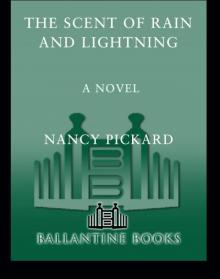 The Scent of Rain and Lightning
The Scent of Rain and Lightning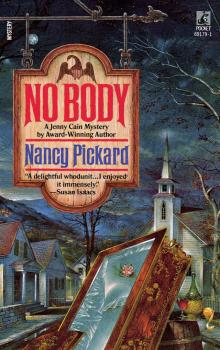 No Body
No Body The Secret Ingredient Murders: A Eugenia Potter Mystery
The Secret Ingredient Murders: A Eugenia Potter Mystery The 27-Ingredient Chili Con Carne Murders: A Eugenia Potter Mystery
The 27-Ingredient Chili Con Carne Murders: A Eugenia Potter Mystery Twilight
Twilight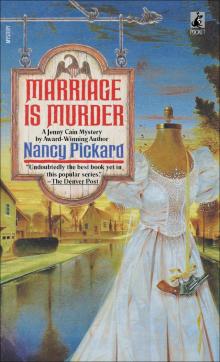 Marriage Is Murder
Marriage Is Murder I.O.U
I.O.U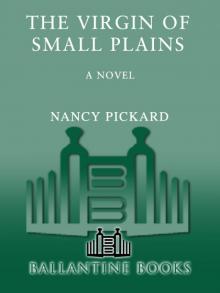 The Virgin of Small Plains
The Virgin of Small Plains Generous Death
Generous Death The Whole Truth
The Whole Truth The Blue Corn Murders
The Blue Corn Murders Say No to Murder
Say No to Murder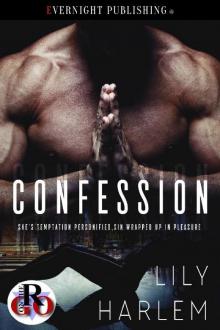 Confession
Confession Dead Crazy
Dead Crazy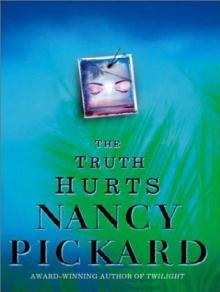 The Truth Hurts
The Truth Hurts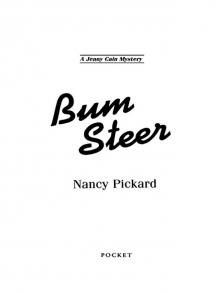 Bum Steer
Bum Steer